| |
|

Scholars-in-residence
program
Presentations are free; kosher meals moderately priced
● Rabbi
Yakov Horowitz, founder, Project Y.E.S. (Youth Enrichment Services)
for
Agudath Israel, Jan. 4-5
● Rabbi Ari
Kahn, director, Foreign Student Programs,
Bar Ilan University, Israel, Feb.
22-23
Call us for details at (619)
287-9890, Reserve Shabbaton meals before January 2
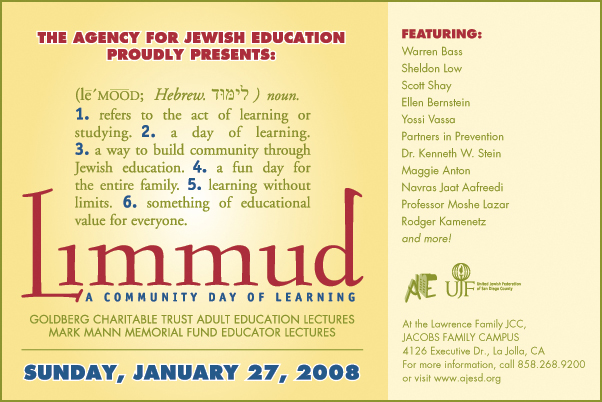

Teen recounts how she was chosen for summer leadership trip to Israel
By Gaby Maio
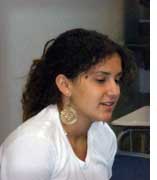 SAN DIEGO—An interview process is always nerve wracking and never easy. Recently, the Jacobs International Teen Leadership Institute (JITLI) chose ten lucky San Diego teens to embark on a trip of a lifetime following an extensive interview process. I was fortunate to be among those selected. SAN DIEGO—An interview process is always nerve wracking and never easy. Recently, the Jacobs International Teen Leadership Institute (JITLI) chose ten lucky San Diego teens to embark on a trip of a lifetime following an extensive interview process. I was fortunate to be among those selected.
The San Diegans will be joined by ten Israeli Jews, and twenty Israeli Arabs who will get to know each other while traveling in San Diego, then through Spain and then through Israel. Along the way we will debate the issues of Israeli society, explore new cultures and confront whatever racial stereotypes any of us may harbor. I entered the interview process in
Gaby Maio
October and was informed on December 7 that I had been chosen for the summer journey underwritten by Gary and Jerri-Ann Jacobs of San Diego.
I have been to Israel four times over the last three years, and each time fell more and more in love. My family purchased an apartment in Jerusalem, from which my mother watches with emotion as the sun plays so beautifully on the Jerusalem stone.
While the Kotel is my favorite place in the world, leaving me with overwhelming tears, I have come to learn that there is a lot more to Israel than my Jewish experiences there.
I enjoy wandering through the Old City, way beyond the Kotel and the Jewish quarter. Since my first visit, I found myself adventuring down the slippery cobblestoned alleyways of the Arab markets to indulge myself in the thick fresh-squeezed orange juice and to purchase freshly steamed t-shirts that say 'Jerusalem.
I found myself walking in the Holy Sepulcher Church, the place that tradition holds was the location of the crucifixion of Jesus, and spending two hours in awe in its confines. I have returned there over five times with different tour guides, each time receiving a different perspective. I found myself dragging my grandparents for walks along the Via Dolorosa, observing the 13 stops marking events described in Christian Scriptures about the humiliation and death of Jesus. On one occasion, I did this in the company of 40 Franciscan Monks.
I have found myself with my Egyptian grandmother learning Arabic so I can speak to taxicab drivers, to Arab-Israelis, and to the construction workers who are building my second home in Jerusalem on a daily basis.
I first decided to apply for JITLI last summer after realizing the many other aspects of Israel. I want to end the division, worlk towards a solution for Israel, and break the racist attitude people have towards Arabs.
The first step of the JITLI interview process was simple. A few pages of paperwork, a physical from the doctor, and a list of questions to answer with short essays. The questions asked the reason for my interest in the JITLI, about my involvement in the Jewish community, how I would take my JITLI experiences out into the world, and what I thought I might gain from JITLI. I spent my time carefully filling out each question so my passion and what I believe could come through in my writing. After I sent the questionnaire in, I was contacted to schedule a one-on-one interview.
As my dad and I pulled into the parking lot at the United Jewish Federaton building, I was no doubt a bit nervous, unsure of what they would be asking me. I was greeted at the door by my friend Tamara Lubesky, a JITLI alumna who went on the trip last summer and attends school with me at San Diego Jewish Academy. JITLI alumni participate in the interviews to help decide who will participate in the program. "Don't worry," Tamara told me, "you'll be fine." She escaped back into the interview room as I made myself comfortable in a cushioned chair directly outside. After a few minutes, Tamara came back outside to tell me it was my turn. Inside, I saw a few familiar faces around a long narrow tabble. There was a big platter of Krispy Kreme donuts and other snacks scattered around. I felt a comfortable vibe and was quickly relieved, and then the questions began.
I was asked about myself and some of my Jewish background experiences. I talked about my love for Israel, why I thought I would make a good candidate, and a little bit about the history of Israel. We even got sidetracked into a conversation about my dad's good cooking and how I should have brought some of his delicious cauliflower. When asked to describe our Friday night Shabbats, another JITLI alumna, Charly Jaffe, who also is a good friend, interrupted and described them herself. As a whole, the interview ended up being light, conversational and comfortable, so I could be myself. I left the interview having enjoyed myself, yet wondering if they liked me enough to advance me to the second round. When I arrived hom, my mom, of course,wanted a play-by-play scne of the whole interview. All I had to do now was wait for an e-mail.
About a week later, I received a message from Jenny Daniels, the junior counselor, congratulating me on making it to the next round. The next step in the process would be a four-hour group meeting at the Jewish Community Center with all those who had applied. Workshops, debates, games and group works all were planned for us to engage in so they could see how we interact in groups. This took place on Thursday, December 6. On arrival, I met some of my friends who also were applying, so we all walked in togehter. Witnh 20 people there, it was quite intimidating as we had to compete against each other. Only five boys and give girls would be accepted.
We accomplished many things throughout the four hours. We had two debates: one required us to pick only two Jewish symbols to represent the Jewish people as a whole. The other was to decide whether we wanted a two-state solution for Israel. Both debates went overtime, and got pretty heated. There were other activities that were fun, including celebrating Chanukah, forming groups to advertise Isael, and picking six most important values from a list of nineteen.
At the ed of the group workshop interview, we wondered where the time went. We left feeling nervous, because all we had to do was wake up on the following a day and learn by telephone call who was chosen and who was not.
When I received Jenny's phone call, I was relieved, excited and extremely happy. My family was as well.
"I can't even tell you, it changed my life," my friend Tamara later told me.
So now I'm ready to embark on atrip of a lifetime, to meet people whom I never would have met without JITLI anjd to learn things otherwise beyond my experiences.



Frum Jewish director stays out of theatres on Shabbat, chooses only tasteful plays
By Eitan Frysh
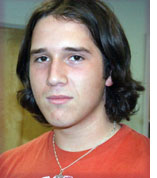 SAN DIEGO—Todd Salovey, an Orthodox Jew who is associate artistic director at the San Diego Rep, says he only works on plays that have ideas and themes that interest him, but added that those ideas do not necessarily have to correspond to his Jewish beliefs. SAN DIEGO—Todd Salovey, an Orthodox Jew who is associate artistic director at the San Diego Rep, says he only works on plays that have ideas and themes that interest him, but added that those ideas do not necessarily have to correspond to his Jewish beliefs.
"As a director, I almost entirely pick the plays I work on," he said. "I can't look at myself in the mirror if I am doing something that doesn't feel important to me. I only work on a play that I am passionate about, whether it has Jewish themes or not."
Eitan Frysh
For several years, Salovey has put on a production of A Christmas Carol, based on the work of Charles Dickens. He said he loves the play because it has a good moral, with Scrooge turning from a grumpy man to a helpful and joyful person.
Salovey is presenting The Blessing of a Broken Heart tomorrow through January 20 at the San Diego Rep. The director wrote the screenplay based on the book by Sherri Mandell.
In contrast, Salovey said, "95 percent of the plays I won't work on or direct." Among the rejects are some plays which have Jewish themes, but which "I don't do because they don't speak to me." However, when he does find a stimulating Jewish play, he takes its message beyond the Jewish community. "I have done Jewish work and presented it in churches and other non-Jewish places," he said.
Salovey not only is independent in his choice of material, but also in conforming his theatre duties to his chosen Orthodox lifestyle. He does not work on Shabbat, which means he is not in the theatre for Friday night or Saturday performances. "I feel the best thing I can be doing for my show on a Friday ngiht is praying," he said.
Knowing that he is an observant Jew, theatre people accept that "this is what I do and how I work," he said. Once people are aware that religion is important to him, "they'll respect it," Salovey said. "But if they see that in some instane you'll honor it and in some instances you'll bend the rules they will never let you do it because they realize it's not part and parcel of who you are and what you do."
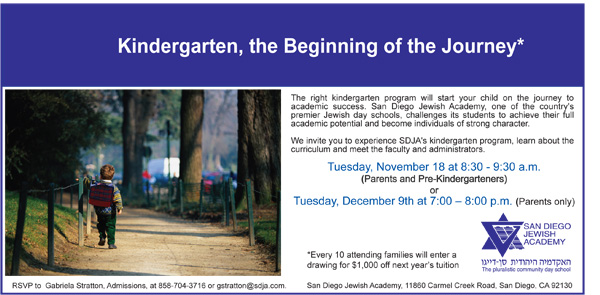


THE JEWISH CITIZEN
Movie probes after-effects of Holocaust
Dear Mr. Waldman will screen twice at San Diego Jewish Film Festival
By Donald H. Harrison
 SAN DIEGO—Dear Mr. Waldman is a story about survivors of the Holocaust trying to make new lives for themselves and their children in Israel, even though their hearts and memories are still in the ashes of Auschwitz and the other Nazi killing camps. SAN DIEGO—Dear Mr. Waldman is a story about survivors of the Holocaust trying to make new lives for themselves and their children in Israel, even though their hearts and memories are still in the ashes of Auschwitz and the other Nazi killing camps.
This 86-minute Israeli film written and directed by Hanan Peled, with Hebrew dialogue and English subtitles, will be screened twice during the 18th Annual San Diego Jewish Film Festival, at 8:45 p.m on the Saturdays of February 9 an
Donald H. Harrison
February 16, respectively at the UltraStar Mission Valley and the AMC La Jolla.
 Moishe Waldman (Rami Heuberger) lost his wife and son in the camps. Following liberation he remarried another survivor Rivka (Jenya Dodina) and together they had two other sons, Jonathan (Roy Mayer) and Hilik (Ido Port). Their household was filled with overpowering sadness. The older son, Jonathan retreated into his books; the younger son, Hilik tried to protect his angina-prone father from any more suffering. And therein lay the story of Dear Mr. Waldman, a 2006 film which in Hebrew was titled Michtavim Le America (Letters to America). Moishe Waldman (Rami Heuberger) lost his wife and son in the camps. Following liberation he remarried another survivor Rivka (Jenya Dodina) and together they had two other sons, Jonathan (Roy Mayer) and Hilik (Ido Port). Their household was filled with overpowering sadness. The older son, Jonathan retreated into his books; the younger son, Hilik tried to protect his angina-prone father from any more suffering. And therein lay the story of Dear Mr. Waldman, a 2006 film which in Hebrew was titled Michtavim Le America (Letters to America).
In the newspaper is a clipping that the new U.S. President John F. Kennedy has appointed as an assistant a man named Jack Waldman. Moshe studies the photo, and believes he detects a family resemblance. He obsesses on the notion that this could be his long-lost son, Yankel After writing a letter of inquiry to the White House, he begins a vigil by the mailboxes of his apartment house, even peeking into the boxes of his neighbors to see if somehow Waldman’s letter was misdelivered.
His obsession pains young Hilik. After talking with a former kibbutznik classmate who is wise beyond her 10 years, the boy decides to take action. He goes to a man with a typewriter, who can write letters in English for a fee for those who need them. Hilik dictates to the man a somewhat ambivalent letter from Jack Waldman, which says he too was from Radom, Poland, the city of Yankel’s birth. Hilik puts the letter into an envelope, tears a canceled stamp from a neighbor’s mail to paste onto the letter and tells his father the long-awaited communication from Jack Waldman finally has come. Matters go from bad to worse, as Moishe decides that the American official must, indeed, be his son and he must travel to America to see him.
All this is too much for Rivka, who stresses that she too lost family in the Holocaust but it is important to move on. They must make lives for themselves in the present; not live in the past. Her anger is rooted in insecurity; Moishe clearly loved his late wife more than he ever shall love her. Eventually, the pain becomes unbearable for both of them. Moishe moves out and takes a lover, another Holocaust survivor. When they make love, they imagine themselves to be in the arms of their murdered first spouses, even calling out the dead ones’ names.
There are a number of subplots that also need to be resolved as the main story works its way to a realistic conclusion. Hilik imagines himself to be Kirk Douglas in the movie, Spartacus, a fantasy which results in him having to change schools. (His love for Spartacus also allows writer Hanan Peled to essay on a film within a film: Hillik obtains still photographs of Spartacus and spots some of the technical mistakes: modern sandals on one character’s feet, a truck on a hill in the background of a battle scene.) A business partner senses Moishe’s vulnerability and decides to cheat him. The municipality of Tel Aviv struggles to provide services to poorer neighborhoods like the one where the Waldmans live. Land developers tout what living will be like in the new city of Holon.
It’s a poignant film, well-worth seeing.
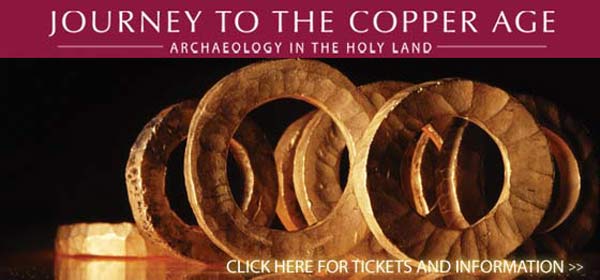

25,000 salmon free for the taking has his mouth just watering for fresh bagels
By Peter Garas
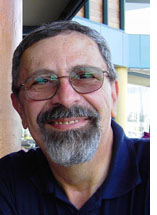 CANBERRA – The Australian media has widely reported the escape of tens of thousands of salmon from a fish farm in Tasmania's south-east, which has thrown the local scalefish industry into turmoil. Up to 25,000 were lost in the week before Christmas as the owners were attempting to harvest the fish, worth about $A1 million. CANBERRA – The Australian media has widely reported the escape of tens of thousands of salmon from a fish farm in Tasmania's south-east, which has thrown the local scalefish industry into turmoil. Up to 25,000 were lost in the week before Christmas as the owners were attempting to harvest the fish, worth about $A1 million.
Wes Ford, the Director of Marine Resources in the Department of Primary Industries and Water reminded people (especially commercial fishermen who seem to be catching the escaped fish along with other species) that it is illegal to sell the fish.
There does not however appear to be any injunction about giving them
Peter Garas
away. Apparently there was a failure while these farmed open sea salmon were being towed to market in a pen and it is assumed that they escaped into the wild.
I guess this means that some people had a very happy new year being able to have their lox delivered to their door and for free. I am afraid I have no idea if you can get a good bagel to go with them though - that's something worth investigating.
What does this mean for the future?
The good news is that this may spawn, if you will pardon the pun, a budding new tourist industry over the next few years in the oceans around Tasmania. If the fish survive and breed then there may well be a new form of fishing in a state already known for its pristine waters and excellent fishing. The bad news is that there is no knowing how a fish species that is not native to the area is likely to impact on the ecology.
Many people I suspect still recall how the introduction of rabbits to Australia managed to create an ecological disaster of considerable proportions in this country.
I guess my personal slant on this story is simply to learn how to make bagels, so that in the future I can go down to Tasmania, buy their already world renowned cheeses and cold climate wines and then hang about until they announce that there is free salmon for the taking so that I can prepare and enjoy the traditional bagels and lox as well as have a fun time touring and fishing.
I wonder if they have capers?

SAN DIEGO JEWISH WORLD THE WEEK IN REVIEW
Garry Fabian in Melbourne, Australia: Australian Red Cross and Christian leaders slam Israel policy on return from trip...Jewish schools featured in top 10 listing...Calling children to act on climate change ...Dux of the school
Dov Burt Levy in Salem, Massachusetts: Readers share opinions on whether we should teach children about the Shoah
Ira Sharkansky in Jerusalem: What about Israeli-on-Israeli violence?
Dorothea Shefer-Vanson in Mevasseret Zion, Israel: A glorious chorus brought in New Year
Tuesday, January 1, 2008 (v2, no. 1)
Peter Garas in Canberra, Australia: Forget the tail of the dog that bit you; now it's the breeze from the air that you heated
Donald H. Harrison in Escondido, California: Dinner and a movie: two fine inter-cultural opportunities
J. Zel Lurie in Delray Beach, Florida: Har Homa once again the monkey wrench in the Middle East peace process
Lynne Thrope in San Diego: Fine restaurants to offer special prix fixe menus during San Diego's 'restaurant week'
MONDAY, DECEMBER 31
Shoshana Bryen in Washington, D.C.: Turkey and U.S. join to fight Kurdish terror
Donald H. Harrison in Los Angeles: Animals stand in for people at Skirball's imaginative, interactive Noah's Ark exhibit
Sheila Orysiek in San Diego: I am resolving to be more resolute
SUNDAY, DECEMBER 30
Shoshana Bryen in Washington, D.C.: Bhutto assassination proves that turmoil in Muslim world is not about the Jews
Rabbi Baruch Lederman in San Diego: The spouse who is waiting just for you
Rabbi Leonard Rosenthal in San Diego: Any Jew can grow up to be a leader of our people
Ira Sharkansky in Jerusalem: Palestinians' violence threatens the establishment of their state, not Israel
FRIDAY, DECEMBER 28
in Simi Valley, California: Nostalgia: Key ingredient at Reagan library
Dorothea Shefer-Vanson in Mevasseret Zion, Israel: Elementary students demonstrate their new-found knowledge of the Torah
< BACK TO TOP
|
|

